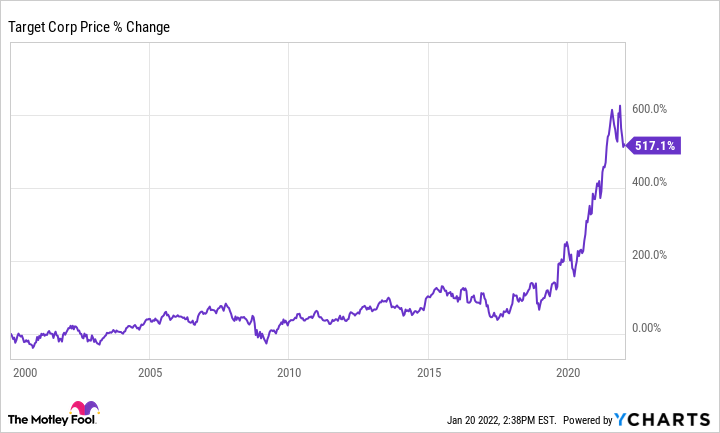This week, Kohl's (KSS 0.74%) became the subject of yet another activist campaign. Macellum Advisors -- which teamed up with several other investment funds to mount a challenge to the Kohl's board in 2021 before settling with the company -- just launched a new attack on the department store giant's leadership.
At one level, shareholders' impatience is understandable: Kohl's stock has gone nowhere for over two decades. Nevertheless, Macellum's activist campaign doesn't make sense in light of the company's rapidly improving results and solid future prospects.

Kohl's stock performance, data by YCharts.
Underperformance of a sort
In a letter to Kohl's shareholders, Macellum argues that Kohl's financial performance is lagging that of rivals. Whereas most apparel-focused retailers have easily surpassed 2019 sales levels over the past year, Kohl's revenue declined slightly compared to 2019 through the first three quarters of fiscal 2021.
Additionally, Macellum notes that while Kohl's profitability has improved compared to 2019, other retailers have experienced even greater margin expansion.
These criticisms miss the forest for the trees. Kohl's is on track to earn a record profit in fiscal 2021. In November, it boosted its full-year guidance for earnings per share (EPS) by more than 20% to a range of $7.10 to $7.30. That would represent a 27% to 30% increase over the prior record EPS of $5.60 set in fiscal 2018. Other retailers may be earning even more extraordinary profits, but it's hard to argue that a company earning record profits needs a big board or management shake-up.
As for Kohl's subpar top-line results, supply chain issues have weighed on sales in recent quarters. Kohl's has made big changes to its merchandise assortment over the past two years, particularly in the women's apparel category, which has exacerbated its inventory shortages.
Finally, Kohl's just launched its new Sephora beauty partnership in August. Adding Sephora shops to most Kohl's stores could provide a significant revenue lift, but the company won't complete that rollout until 2023. In short, it is far too early to call management's revenue growth strategy a failure.

Image source: Kohl's.
Desperate for "value creation"
Macellum's suggestions for what Kohl's should do also highlight the fund's impatience. While Macellum's letter contains some vague suggestions for operational improvements, the fund spends far more time promoting various financial engineering strategies.
First, Macellum recommends selling billions of dollars of owned real estate and leasing it back to raise cash that can be used for share repurchases. Second, it jumps on the bandwagon of calling for department store chains to spin off their e-commerce operations to achieve better valuations. Third, the fund wants Kohl's to hire advisors to explore a potential sale of the company.
Considered separately, these recommendations seem dubious, and taken together, they make even less sense. For example, Macellum claims that its sale-leaseback strategy alone would double the stock price to at least $100. If that's true, there would be no reason to try selling the company. Even in a best-case scenario, a sale wouldn't fetch that much.
Focus on fundamentals, not the stock price
Ultimately, Macellum's main criticism of Kohl's has little to do with how the company is being run. The fund is simply frustrated with the stock's poor performance. Yet in the short run, the stock price is largely outside of management's control.
In the long run, if management's revenue and earnings growth strategies succeed, Kohl's stock should soar well above $100 -- particularly because the company is using its prodigious cash flow to buy back lots of stock. The longer the stock stays mired in a slump, the more shares Kohl's will be able to repurchase at a discount, increasing the stock's upside potential.
Macellum might retort that Kohl's stock has been struggling not just for a few years but for two decades. But Kohl's CEO Michelle Gass took the top job less than four years ago, and the pandemic has overshadowed half of her tenure.
Target highlights the importance of patience. For two decades, the share price barely budged. However, Target stock has surged over the past few years thanks to a string of strong results and growing investor confidence in the company's long-term prospects.

Target stock performance, data by YCharts.
Rather than betting on desperate financial engineering strategies, Kohl's shareholders should give management at least two more years to finish implementing its growth strategy. If it succeeds, Kohl's shareholders will likely reap handsome rewards before too long.



